Indigenous Leader Tries to Thwart Loggers in Amazon
ALTAMIRA, Brazil (AP) — An indigenous leader in Brazil’s Amazon says he will do what he can to stop loggers and prospectors encroaching on his people’s land.
Kadjyre Kayapo, his son and other companions searched in recent days for signs of trespassing in the lush rainforest of the Kayapo indigenous group’s land in Pará state.
The routine patrol came after a month in which fires swept many areas of the Amazon, causing an international outcry over the growing threat to a vast area that drains heat-trapping carbon dioxide from the atmosphere.
Kadjyre Kayapo is head of Krimej village, where villagers run a surveillance operation that tries to monitor incursions into indigenous territory.
“I founded this village to prevent the loggers getting into our territory,” said the leader, who wore a traditional headdress and a necklace reading “Jesus Christ” in Kayapo language.
Brazilian President Jair Bolsonaro contends that past allocations of land to indigenous people, many of whom live in the Amazon rainforest, were excessive. About 14% of Brazil is indigenous territory, a huge area for those groups’ relatively small numbers, the president said.
Bolsonaro has faced criticism for saying rainforest protections are blocking Brazil’s economic development. He has said European countries expressing concern have done enough damage to the environment themselves and should focus on their own reforestation.
The data released on September 2019, said there was a 196% increase in fires in the Brazilian Amazon in comparison to August of last year. In August 2010, there were 45,018 fires. Fires are most common in the Amazon from August through October, during the dry season.
Much of the deforestation in the Brazilian Amazon is done illegally. Landgrabbers practice slash-and-burn techniques to clear forest for agriculture and loggers encroach on national forests and indigenous reserves.
Read more
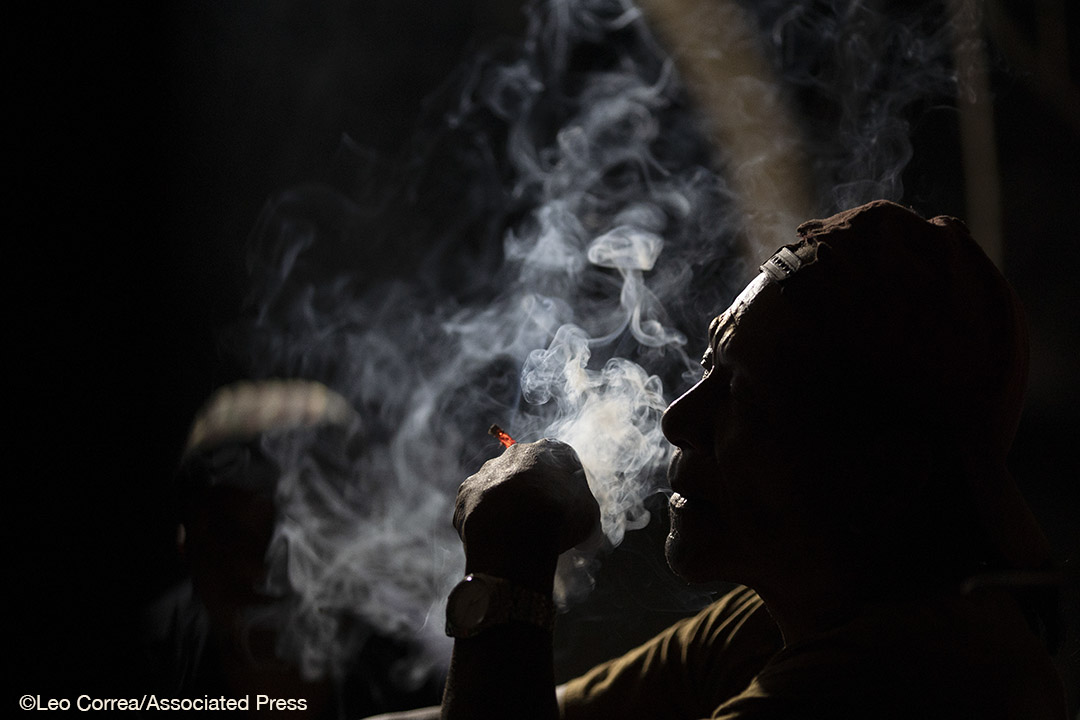
Krimej village indigenous Chief Kadjyre Kayapo, of the Kayapo indigenous community, smokes a cigarette as he talks to members of a territorial monitoring and surveillance base, on the Menkragnotire indigenous land in Altamira, Brazil, Friday, Aug. 30, 2019. Much of the deforestation in the Brazilian Amazon is done illegally -- land grabbers burn areas to clear land for agriculture and loggers encroach on national forests and indigenous reserves, and Kayapo says that he does not want loggers and prospectors on his land. (AP Photo/Leo Correa)
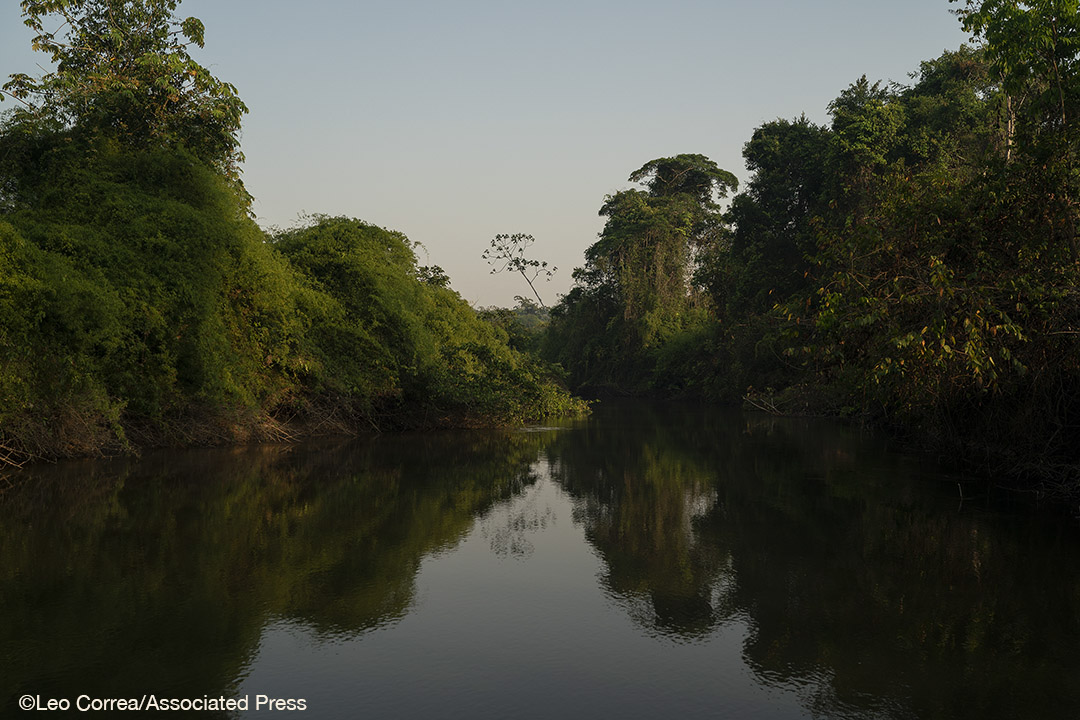
The Pitchacha River divides the Biological Reserve Serra do Cachimbo, left, from the Menkragnotire indigenous lands of the Kayapo indigenous people in Altamira, Brazil, Saturday, Aug. 31, 2019. Much of the deforestation in the Brazilian Amazon is done illegally -- land grabbers burn areas to clear land for agriculture and loggers encroach on national forests and indigenous reserves. (AP Photo/Leo Correa)

Krimej village indigenous Chief Kadjyre Kayapo, of the Kayapo indigenous community, waits on a boat to survey indigenous land from the Pitchacha River on the Menkragnotire indigenous land in Altamira, Brazil, Saturday, Aug. 31, 2019. Much of the deforestation in the Brazilian Amazon is done illegally -- land grabbers burn areas to clear land for agriculture and loggers encroach on national forests and indigenous reserves, and Kayapo says that he does not want loggers and prospectors on his land. (AP Photo/Leo Correa)
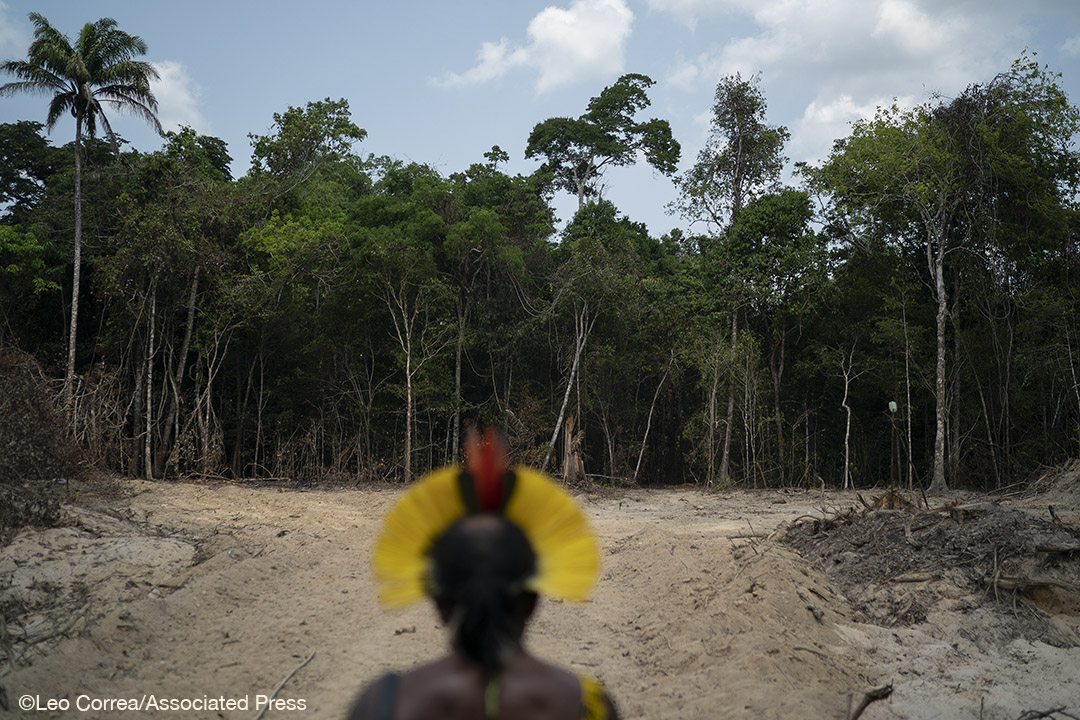
In this Aug. 31, 2019 photo, Krimej indigenous Chief Kadjyre Kayapo, of the Kayapo indigenous community, looks out at a path created by loggers on the border between the Biological Reserve Serra do Cachimbo, front, and Menkragnotire indigenous lands, in Altamira, Para state, Brazil. Much of the deforestation in the Brazilian Amazon is done illegally -- land grabbers burn areas to clear land for agriculture and loggers encroach on national forests and indigenous reserves, and Kayapo says he does not want loggers and prospectors on his land. (AP Photo/Leo Correa)
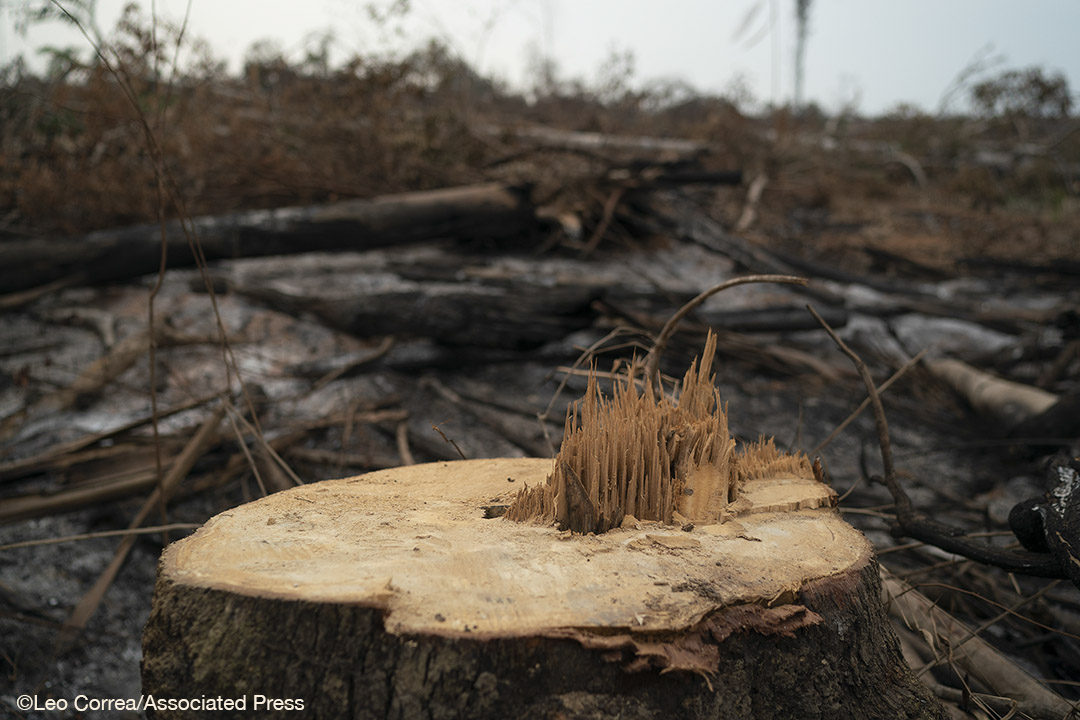
A cut tree stands in a burned area near the Krimej indigenous village of the Kayapo indigenous group in Altamira, Para state, Brazil, Saturday, Aug. 31, 2019. Much of the deforestation in the Brazilian Amazon is done illegally -- land grabbers burn areas to clear land for agriculture and loggers encroach on national forests and indigenous reserves. (AP Photo/Leo Correa)
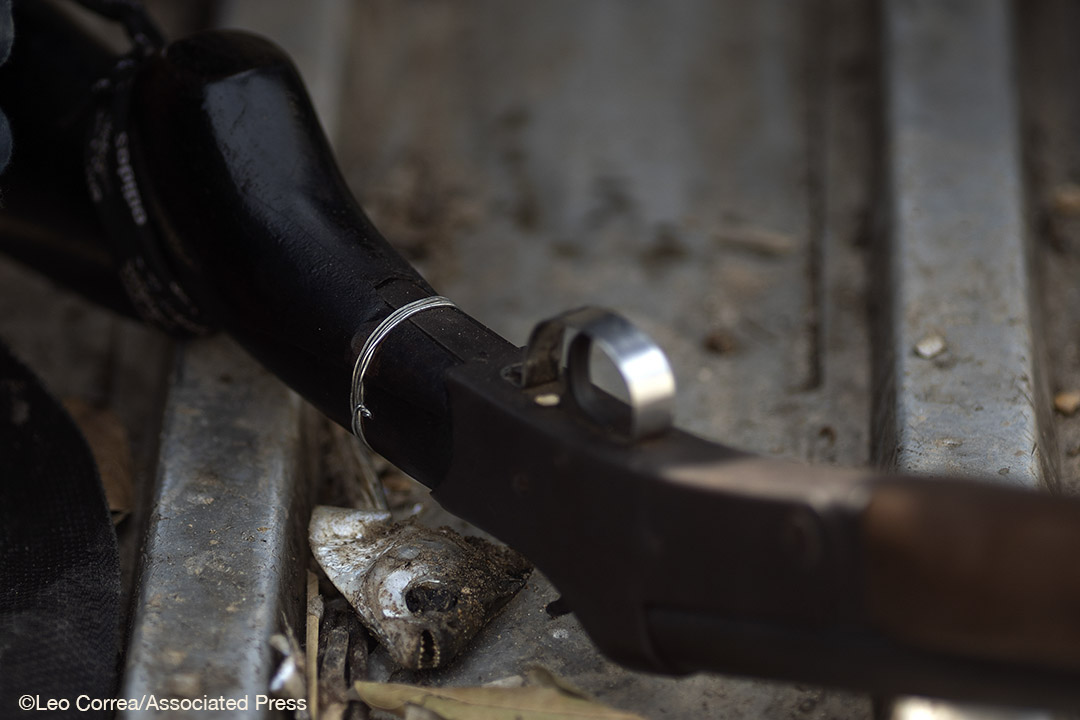
A fish head is seen in the boat under a rifle as members of the Kayapo indigenous group navigate the Pitchacha River as they survey Menkragnotire indigenous land in Altamira, Brazil, Saturday, Aug. 31, 2019. Much of the deforestation in the Brazilian Amazon is done illegally -- land grabbers burn areas to clear land for agriculture and loggers encroach on national forests and indigenous reserves. (AP Photo/Leo Correa)
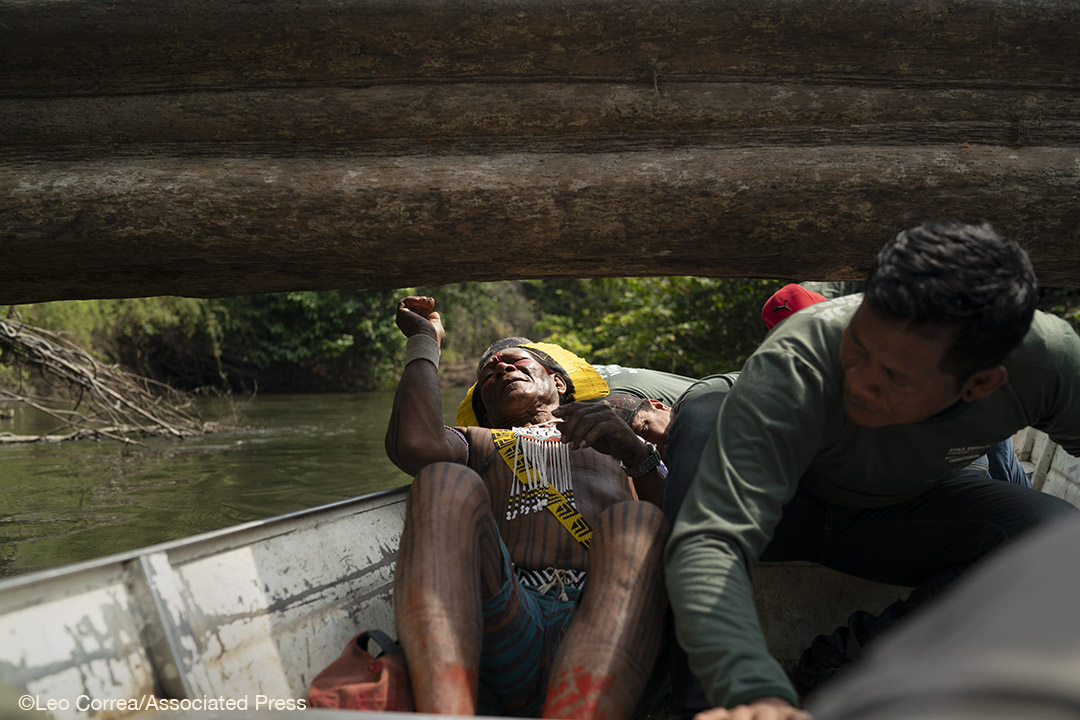
Krimej village indigenous Chief Kadjyre Kayapo, of the Kayapo indigenous community, lays back to pass under a fallen tree on the Pitchacha River as he boats to a bridge constructed by loggers as he surveys Menkragnotire indigenous land in Altamira, Brazil, Saturday, Aug. 31, 2019. Kayapo says that he does not want loggers and prospectors on his land. (AP Photo/Leo Correa)
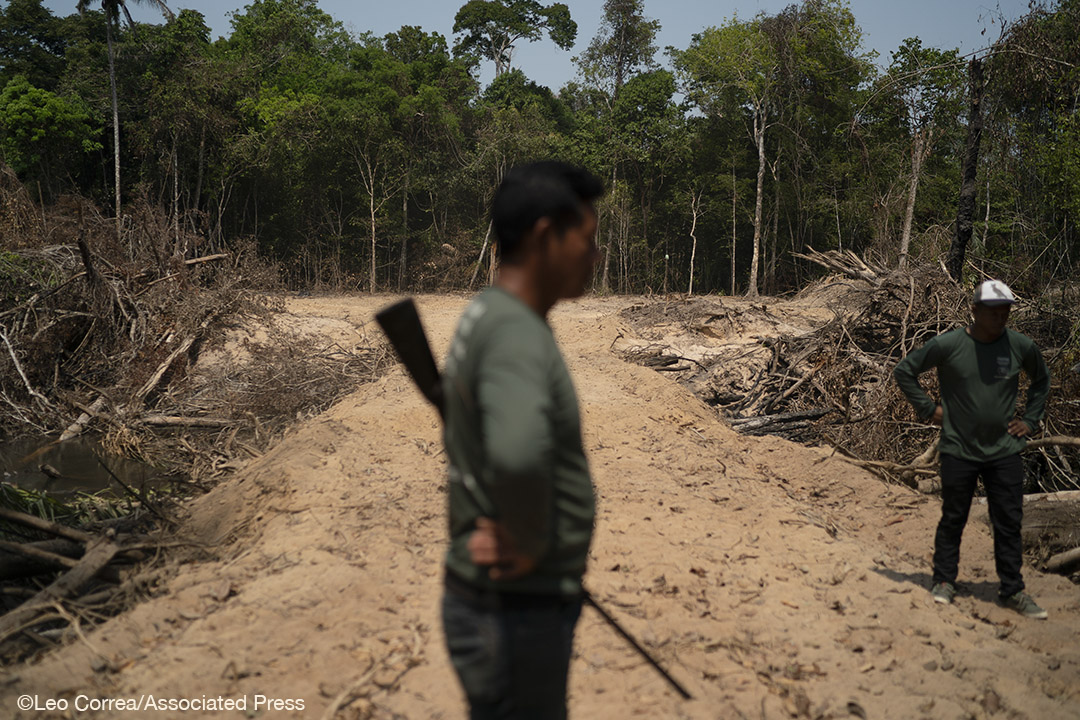
Monhire Menkragnotire, of the Kayapo indigenous community, stands where loggers opened a path to enter Menkragnotire indigenous lands on the border with the Biological Reserve Serra do Cachimbo in Altamira, Para state, Brazil, Saturday, Aug. 31, 2019. Much of the deforestation in the Brazilian Amazon is done illegally -- land grabbers burn areas to clear land for agriculture and loggers encroach on national forests and indigenous reserves. (AP Photo/Leo Correa)
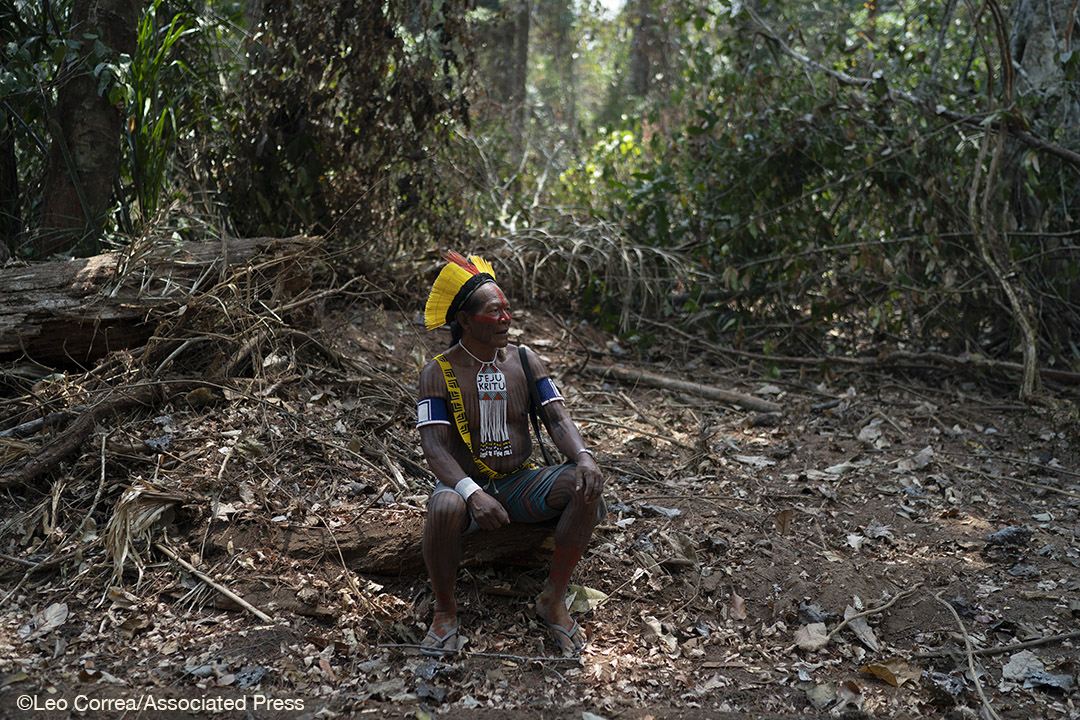
Krimej village indigenous Chief Kadjyre Kayapo, of the Kayapo indigenous community, pauses on the path opened by illegal loggers on the border between Menkragnotire indigenous lands and the Biological Reserve Serra do Cachimbo in Altamira, Para state, Brazil, Saturday, Aug. 31, 2019. Much of the deforestation in the Brazilian Amazon is done illegally -- land grabbers burn areas to clear land for agriculture and loggers encroach on national forests and indigenous reserves, and Kayapo says he does not want loggers and prospectors on his land. (AP Photo/Leo Correa)
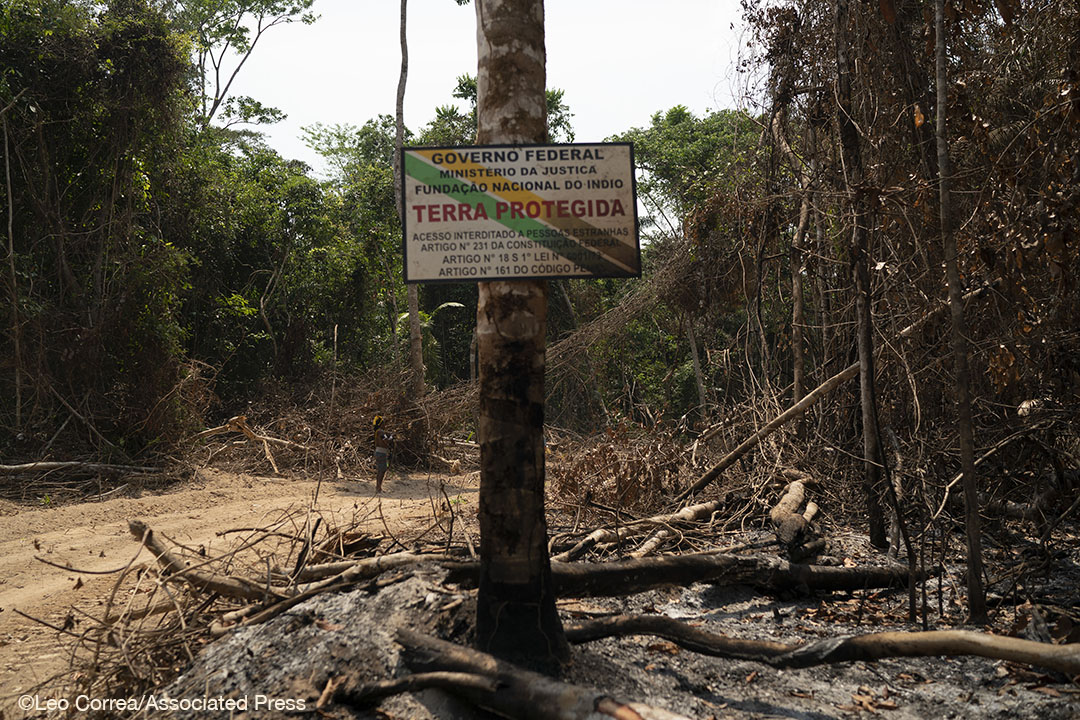
A sign reads in Portuguese "Protected area" on the border between Menkragnotire indigenous lands and the Biological Reserve Serra do Cachimbo in Altamira, in Para state, Brazil, Saturday, Aug. 31, 2019. Much of the deforestation in the Brazilian Amazon is done illegally -- land grabbers burn areas to clear land for agriculture and loggers encroach on national forests and indigenous reserves. (AP Photo/Leo Correa)
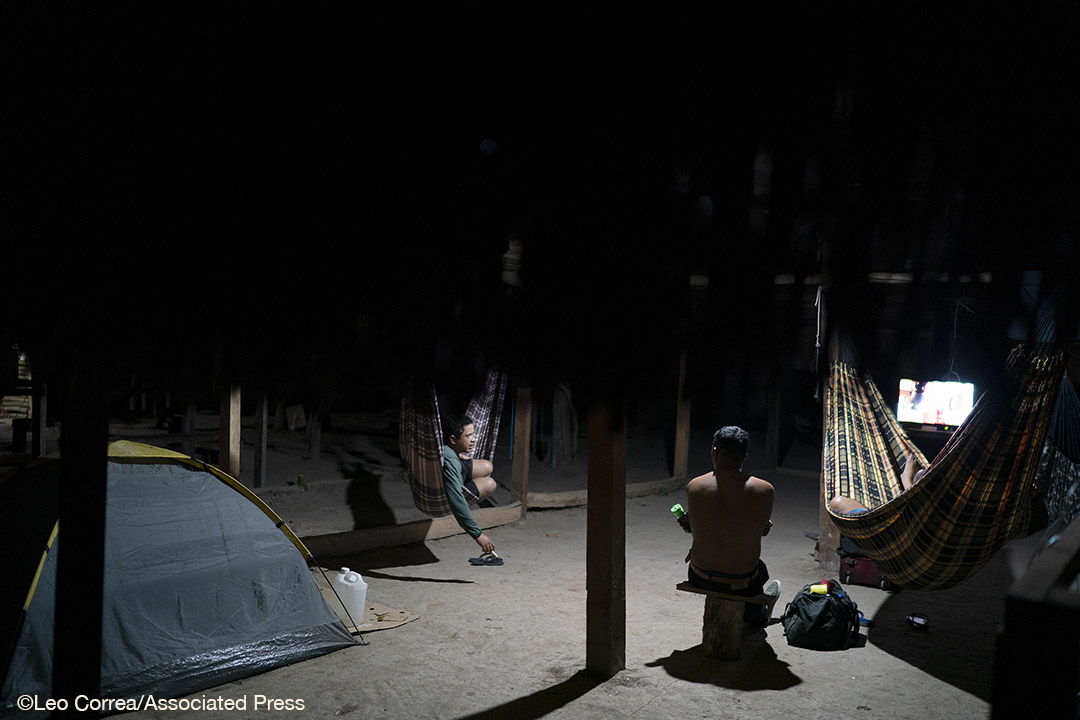
Non-indigenous workers watch television at a monitoring and surveillance base on Menkragnotire indigenous land, which belong sto the Kayapo indigenous group in Altamira, Brazil, Friday, Aug. 30, 2019. Much of the deforestation in the Brazilian Amazon is done illegally -- land grabbers burn areas to clear land for agriculture and loggers encroach on national forests and indigenous reserves. (AP Photo/Leo Correa)
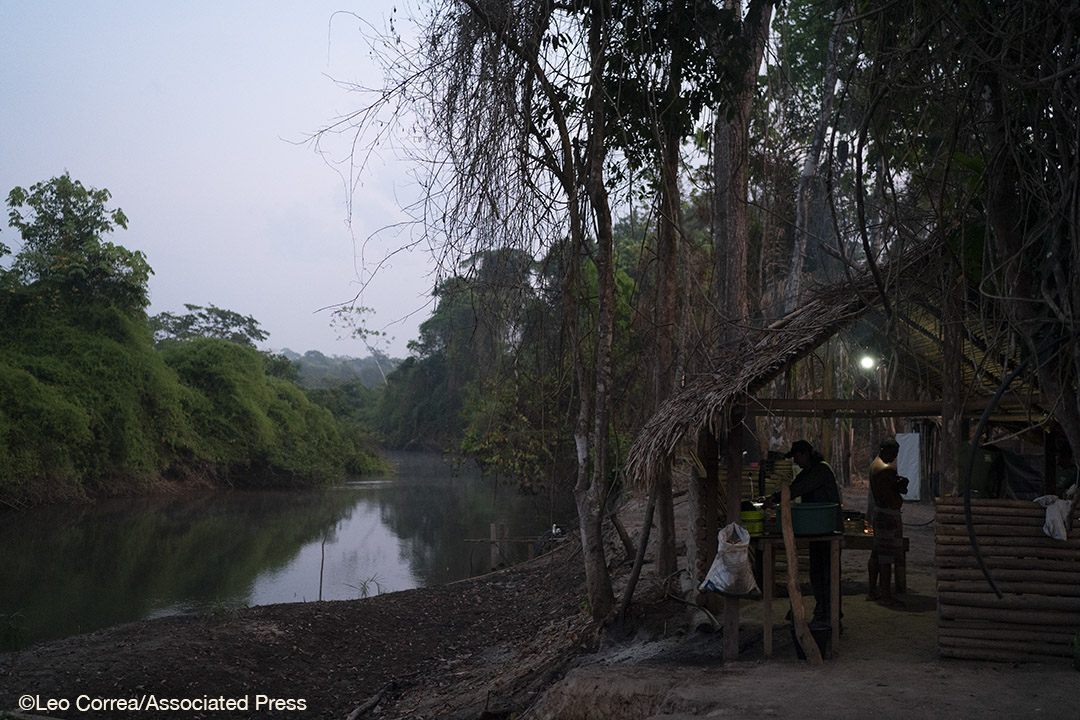
Non-indigenous people who work at a monitoring and surveillance base wash dishes at dawn near Krimej village on Menkragnotire indigenous land that belongs to the Kayapo indigenous group in Altamira, Para state, Brazil, Saturday, Aug. 31, 2019. Much of the deforestation in the Brazilian Amazon is done illegally -- land grabbers burn areas to clear land for agriculture and loggers encroach on national forests and indigenous reserves. (AP Photo/Leo Correa)
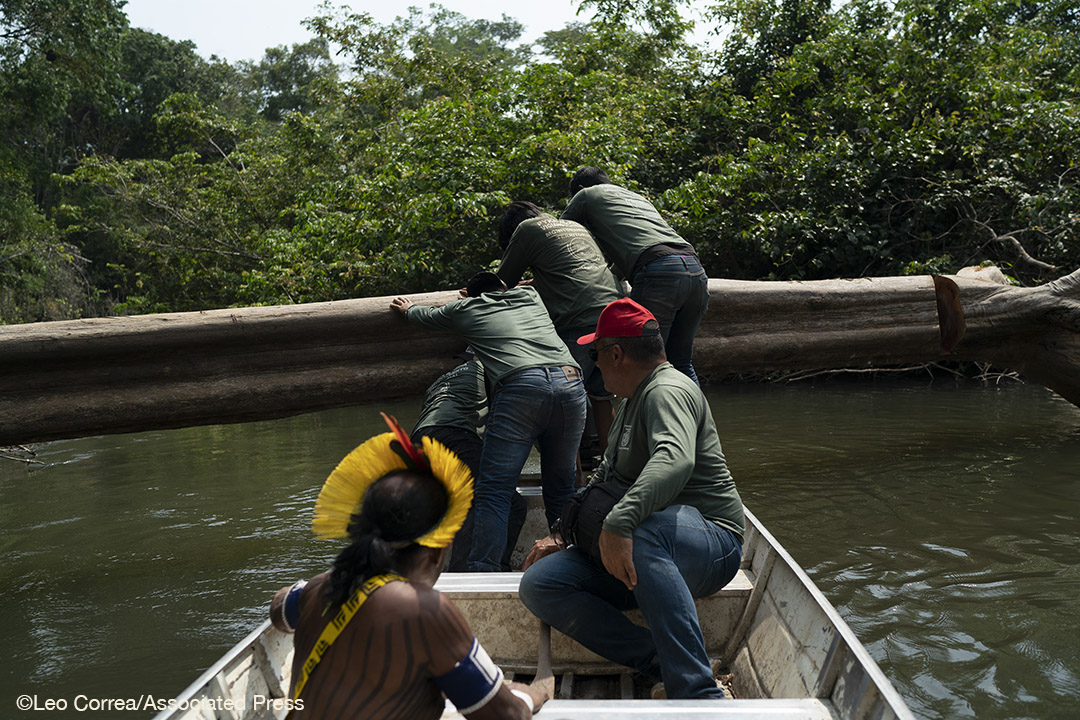
Krimej village indigenous Chief Kadjyre Kayapo, of the Kayapo indigenous community, left, and others work to pass a fallen tree on the Pitchacha River as he boats to a bridge constructed by loggers as they survey Menkragnotire indigenous land in Altamira, Brazil, Saturday, Aug. 31, 2019. Much of the deforestation in the Brazilian Amazon is done illegally -- land grabbers burn areas to clear land for agriculture and loggers encroach on national forests and indigenous reserves, and Kayapo says that he does not want loggers and prospectors on his land. (AP Photo/Leo Correa)
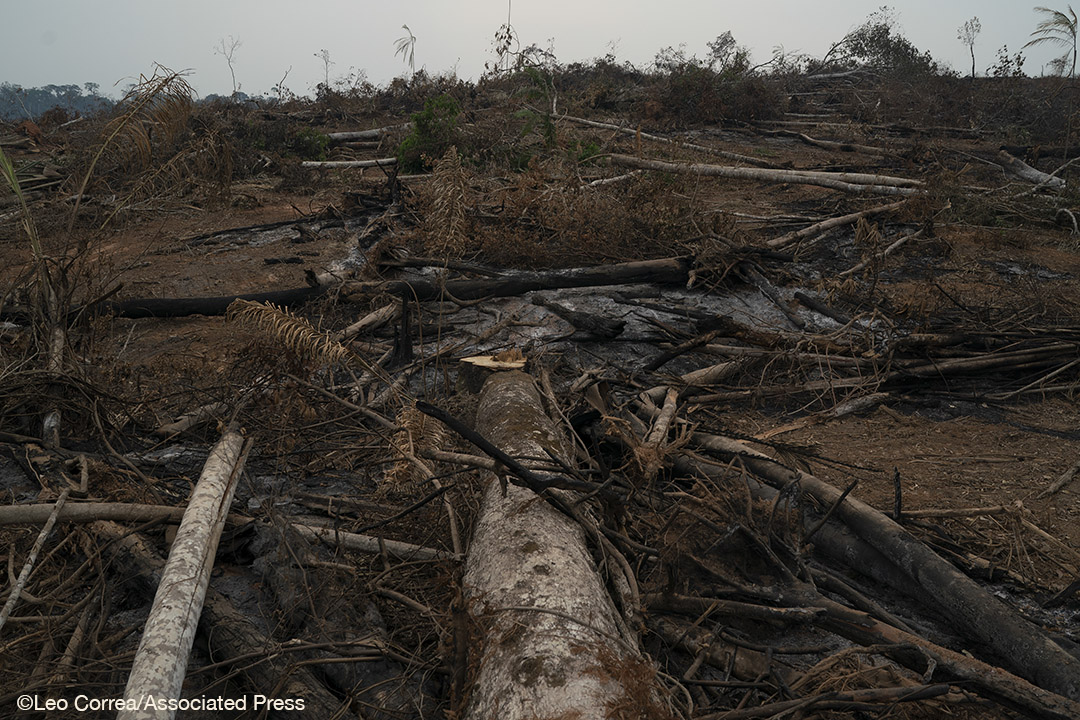
Trees lay in a burned area near the Krimej indigenous village of the Kayapo indigenous group in Altamira, Para state, Brazil, Saturday, Aug. 31, 2019. Much of the deforestation in the Brazilian Amazon is done illegally -- land grabbers burn areas to clear land for agriculture and loggers encroach on national forests and indigenous reserves. (AP Photo/Leo Correa)
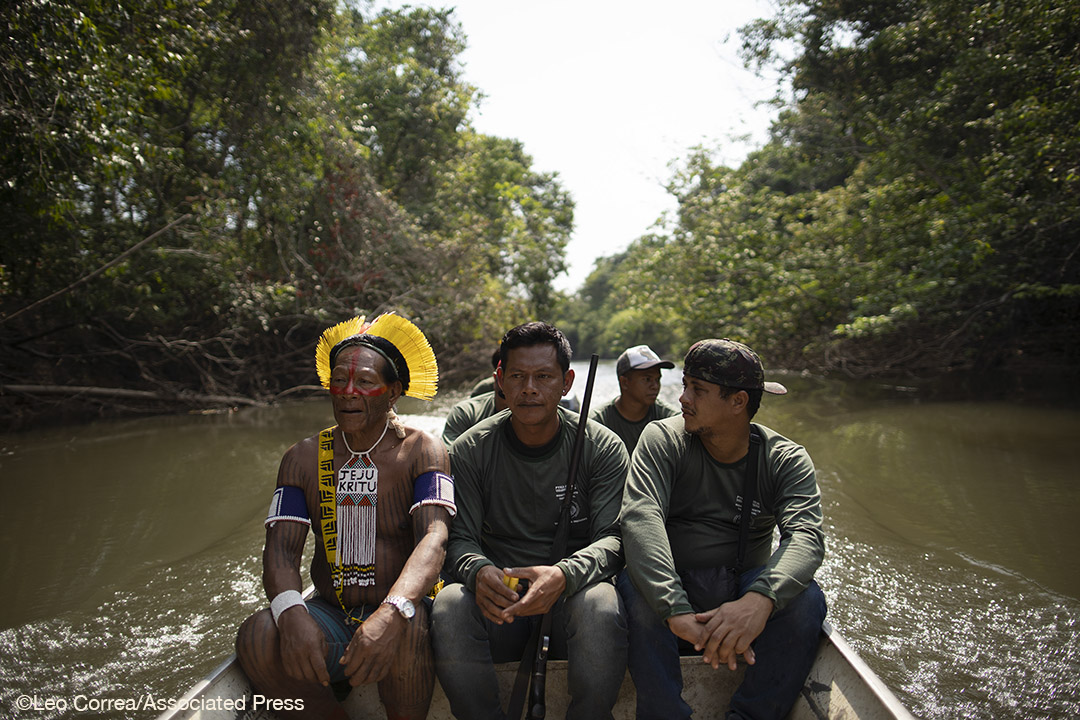
Krimej village indigenous Chief Kadjyre Kayapo, of the Kayapo indigenous community, sits next to his son Monhire Menkragnotire, center holding a rifle, on the Pitchacha River as they advance to a bridge constructed by loggers as they survey Menkragnotire indigenous land in Altamira, Brazil, Saturday, Aug. 31, 2019. Much of the deforestation in the Brazilian Amazon is done illegally -- land grabbers burn areas to clear land for agriculture and loggers encroach on national forests and indigenous reserves, and Kayapo says that he does not want loggers and prospectors on his land. (AP Photo/Leo Correa)














